Following Jacob Zuma’s resignation late Wednesday, his former deputy, Cyril Ramaphosa was elected South Africa’s new president in a parliamentary vote today, Thursday, 15 February 2018. Ramaphosa was the only candidate nominated in parliament, hence was elected unopposed as no vote was needed to make him president.
In a televised address to the nation on Wednesday, Zuma said although he disagreed with his party’s decision, he has always been a disciplined member and will resign as is the order. “I have therefore come to the decision to resign as president of the Republic with immediate effect. Even though I disagree with the decision of the leadership of my organization, I have always been a disciplined member of the ANC”, Zuma said.
The 75-year-old, whose nine-year tenure was marred by economic decline and several charges of corruption, said he feared no motion of no confidence or impeachment (contrary to what many may think), and that he will continue to serve the people of South Africa and the ANC.
Ramaphosa, on the other hand, has waited most of his adult life to step into the office of the president, to be South Africa’s helmsman. It is said that the 65-year-old has eyed the seat since 1994 when ANC came to power and that he was gravely disappointed when Nelson Mandela chose Thabo Mbeki as his successor.
Apparently, Ramaphosa is chuffed to become president but he has his work cut out for him. He has to revive South Africa’s dying economy; reduce unemployment, which is currently at 27 percent; fix state-owned firms; avoid credit downgrades; revive key sectors like the mining sector, and aggressively tackle corruption to improve investor confidence in the country.
Already, the market is happy with Zuma’s resignation; the rand has been on a climb against the dollar since news of Zuma’s imminent resignation circulated on Tuesday, reaching its highest levels in three years. The country’s major stock market index went up nearly four percent, putting it on track for its biggest one-day gain in over than two years.
Ramaphosa also has to mend a divided ANC and restore its credibility, which has been tarnished under Zuma’s leadership. Albeit, there is a renewed sense of hope for South Africa and Ramaphosa himself; the ANC leader turned President has said that the country is coming out of a period of darkness and uncertainty, and entering a new phase.
However, even as most South Africans celebrate the ‘zexit’ of Zuma, not everyone is pleased with Ramaphosa taking the reins. BBC reports that members of an opposition party, the Economic Freedom Fighters, walked out of the parliamentary debate as they would rather have new elections than the ANC deciding on the identity of the new president. Ramaphosa is expected to give his first state of the nation address on Friday.








